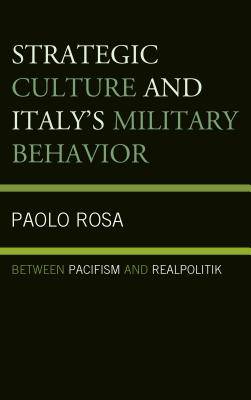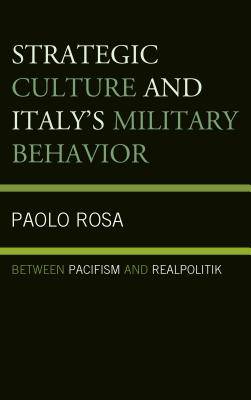
- Afhalen na 1 uur in een winkel met voorraad
- Gratis thuislevering in België vanaf € 30
- Ruim aanbod met 7 miljoen producten
- Afhalen na 1 uur in een winkel met voorraad
- Gratis thuislevering in België vanaf € 30
- Ruim aanbod met 7 miljoen producten
Zoeken
Strategic Culture and Italy's Military Behavior
Between Pacifism and Realpolitik
Paolo Rosa
Hardcover | Engels
€ 164,95
+ 329 punten
Omschrijving
Italy, although it considers itself to be a middle-sized power on par with France, the United Kingdom, and Germany, has been incapable of playing an international role comparable to theirs, instead keeping a low-profile foreign policy. This has not been due to any material constraints--Italy's profile has remained consistently low, through economic times both good and bad--but rather to the country's strategic culture, a mixture of realpolitik and pacifist tendencies. This book sets out to analyze the influence of Italy's strategic culture on its foreign policy. It conducts an exploratory case study to show if hypotheses generated by the strategic culture approach can shed some light on the puzzling Italian behavior in the international arena (puzzling because Italy shows a less assertive foreign policy vis-à-vis other middle powers in the same rank). The first chapter considers the main interpretations of Italian foreign policy and their limitations. The second and third chapters review the literature on strategic culture, stressing its utility for the Italian case. The fourth chapter describes the country's strategic culture through the Liberal, Fascist, and Republican periods, and the fifth chapter analyzes the influence of ideational factors on Italy's behavior abroad. Conclusions sum up the various emerging evidences. Scholars of political science, international relations, strategic studies, and comparative politics will find this work to be of interest.
Specificaties
Betrokkenen
- Auteur(s):
- Uitgeverij:
Inhoud
- Aantal bladzijden:
- 158
- Taal:
- Engels
Eigenschappen
- Productcode (EAN):
- 9781498522816
- Verschijningsdatum:
- 21/04/2016
- Uitvoering:
- Hardcover
- Formaat:
- Genaaid
- Afmetingen:
- 157 mm x 231 mm
- Gewicht:
- 362 g

Alleen bij Standaard Boekhandel
+ 329 punten op je klantenkaart van Standaard Boekhandel
Beoordelingen
We publiceren alleen reviews die voldoen aan de voorwaarden voor reviews. Bekijk onze voorwaarden voor reviews.








